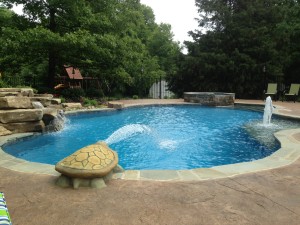 All pools lose water due to evaporation- this is natural and inevitable. Do you notice your pool losing water more quickly than normal? If you are needed to add more than 2 inches of water to your pool each week, you most likely have a leak somewhere. Leaks can be tricky because it might be hard to identify the source of the problem. Pools can leak through any of the fittings, plumbing, or even through the shell. It is important to repair these leaks before they can do further damage to structural components.
All pools lose water due to evaporation- this is natural and inevitable. Do you notice your pool losing water more quickly than normal? If you are needed to add more than 2 inches of water to your pool each week, you most likely have a leak somewhere. Leaks can be tricky because it might be hard to identify the source of the problem. Pools can leak through any of the fittings, plumbing, or even through the shell. It is important to repair these leaks before they can do further damage to structural components.
Leak detection can be an art form. Most leaks are simple and inexpensive repairs. So, if you think your pool is leaking water, read through this check list before you call a professional for service.
- Does your pool leak all the time? If your pool leaks all the time, you may want to look first at the pool shell. Things to look for: cracks in plaster or tears in vinyl. Examine the tile line and the inside of the skimmer. It is common for pools to leak between the plastic skimmer and the concrete pool. This is a simple fix with pool putty. If you do find something that appears to be a crack, a easy test can be performed. Drop some of your pH test reagent near it (be sure to do this while your pump is turned off and your water still). Look closely at the dye and see if it gets sucked into the crack. If it does, you found your problem. If it doesn’t, it most likely isn’t the source of the leak.
- Is the pool only leaking when the equipment is ON? this could be an indication of a pressure-side return leak. When the filter pump is on, the plumbing on the outside is under pressure. This can open up small drips or large sprays of water. Check out the waste or backwash line for running or leaking water.
- Is the pool only leaking when the equipment is OFF? This is a great indicator of a suction-side leak. When the filter pump is on, the plumbing on the inside of the pool is under vacuum. Air can be drawn in through leaking gaps. You might begin to notice air in the pump basket or air bubbling out of the return lines. Use a tape pencil to mark your water levels.
- Are there wet spots around the outside of your pool? Walk around the edge of your pool and between the pool and equipment area. Check for wet soil or erosion.
- Do you see leaks on the equipment pad? Check the ground thoroughly for moisture. Watch the pump closely as you turn it on and off. Do you notice any moisture spraying out?
- Does the water stabilize at a certain level? To find this out, try closing the skimmer valve and let the water level drop below the skimmer. If the water keeps leaking, you can then rule out the skimmer basket. Underwater lights are also a common source of leakage. Try another dye test.
- Does your pool have a vinyl liner? Examine the liner for sinkholes. Sand under the liner may have washed away. there could be tears or separations around all of the fittings. Examine steps and corners. It might even be necessary for you to spend some time under water with a mask to find the small leaks. Keep in mind- there can always be more than one leak.
Are you unsure if your pool has a leak or if water is naturally evaporating? This can be solved with a simple evaporation test. Place a bucket of water next to your pool. Mark both the level of water in the bucket and the level of water in the pool. Wait 24 hours and check the water levels in both. If your pool has lost more water than your bucket, your pool has a leak. If it’s the same, you may just have a higher evaporation rate than you originally thought.
If you can’t find the source of your leak, contact a professional. Prices for leak inspections vary, but usually they are minor repairs. As always, contact a technician at Ask the Pool Guy, we would be happy to help!
